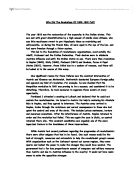One of the main ways that Austria ensured Italy remained in its Empire was by using military force to put down the revolutions and keeping control. The first time the Italians truly saw the wrath of Austria was when the poverty stricken Naples erupted in revolts in January 1820 due to political and economic grievences. Restrictions on personal freedom and a corrupt government led the Carbonari to march on Naples (July 2, 1820) to the cry of "Long live liberty and the constitution." This led King Ferdinand I to grant a constitution which limited royal powers, decreased centralization, and reduced the influence of the capital. The new regime proved short-lived, however, as at the Congress of Vienna, Austria had been conceded the prerogative of intervening, if necessary, to maintain the restored Bourbon monarchy. Thus, in January 1821 Metternich convened an international congress at Laibach (Ljubljana) attended by representatives of the European powers and of the Italian states and by King Ferdinand himself. After Rerdinand requested help and obtained approval for military intervention, the Austrian army entered the kingdom and occupied Naples on March 23, 1821, reestablishing the king's absolute government. This, consequently led to the defeat of Sicilian revolutions (which had spread quickly from Naples) as Naples could soon take control of Siciliy again with the Austrian army firmly in control. A similar revolt in Piedmont was put down by the Austrians at Novara on April 8, 1821.
Furthermore, the Austrian army only strengthend after these revolutions in the years 1820-21. With a new realisation as the determination of Italy, they could see how truly dangerous future revolts could be – especially if employed with more force and organisation. This is highlighted in the revolutions in the years 1848 – 49. In January 1848, people in Milan refused to buy tobacco or play the lottery because this fed the Austrian assets – tabacco was an Austian state monopoly. Small fights developed into larger riots and eventually into a full scale revolution causing the commander-in-chief of the Austrian forces in Italy, General Radetzky, decided to withdraw from the city. However, this was not because he was defeated, but because the situation in Austria had dramatically changed. Revolution had broken out in Vienna and Metternich had resigned. Therfore, after the failure of the Austrian revolutions, the Austrian army had even more troops to use against the Italian army and returned with reinforcements deafeating Piedmont and regaining control of Lombardy at the batter of Custozza and then again at the battle ofNovara in march. Moreover, Austrian armies had more superior military skills than the Italians did. They also had more troops than the Italians had 75,000 troops to Italy’s 30,000 troops. Austria also had the advantage of the leadership of Radetzky who was a skilful general; his leadership was important to the Austrian army as his guidance was much better than that of Charles Albert’s. The Austrian army was also very well equipped with weapons while the Italian army was not. However, since all the Italian states couldn’t agree on what they wanted made it much easier for the Austrian army to stop the revolts.
The Austrians may have put down a large number of the revolutions, but this would not have been possible if the revolutions weren’t weak and unorganised themselves. Many argue that the main reason for the weakness of the revolutions and the eventual failure is in fact the fragmentation of Italy both geographically and in terms of the visions each state had for Italy. Geographically, Italy was disjoined. In the 1800’s, ‘Italy’ was not Italy as we know it today. Instead it was a collection of eight individual states. Prince Klemens von Metternich referred to ‘Italy’ as just a ‘geographical expression’. There was no common language or culture. In terms of the revlutions, this not only made organisation very difficult but it also made life easier for the Austrians to come and end the revolutions as they were split up and therefore more controllable. In fact, Italy was so separate that within these divided states there was a major conflict that would eb incredibly detrimental to Italy’s fight to unification. Some states (such as Tuscany and parma) had progressive restoration governments that modernised educations and the way the country was being governed, wheras other states (Piedmont, Moderna, Papal States and Naples) rules in a reactionary way. Moreover, each state had their own leader with their own views such as moderna which ,thanks to it’s leader hasburg Duke Franncis IV, was confined to the small ducy of Moderna. Moderna was isolated as it’s leader hated liberals and had problems with Austria too – a clear example of how the states were utterly fragmented. The eventual result of this, is political and visionary fragmentation too; the citizens of Italy would feel more likely feel parochialism rather than Nationalism. Their loyalties would lie with their own towns and culture even rather than their own state, let alone Italy as a whole. Therefore, Italian nationalism was not the main priority for the revolutionaries; the revolts were most likely driven by the want of independence for their own state and a voice in their own government. For instance, neither in the reolutions between 1820-21 or 1848-49 did the states join in their outrage of the Austrians oppressive rule. The only occasion where this could have occurred was when Milan asked for Piedmont’s help.








